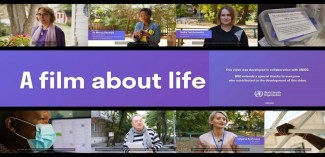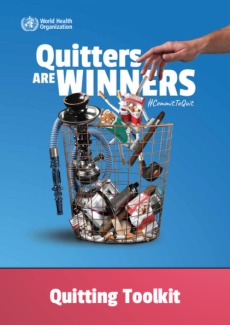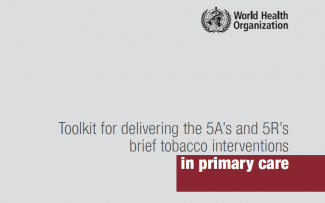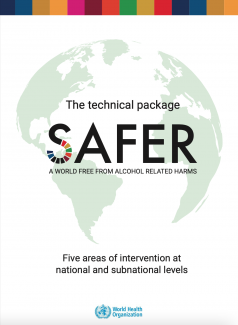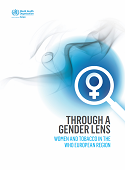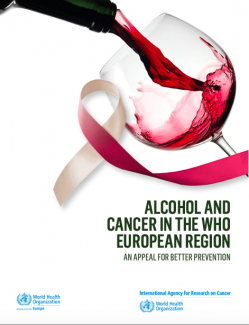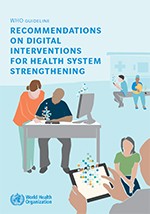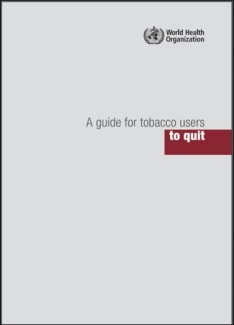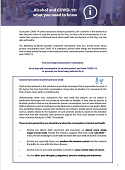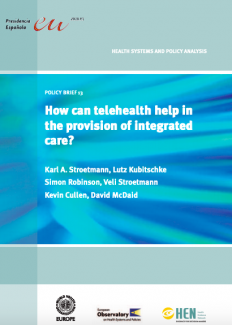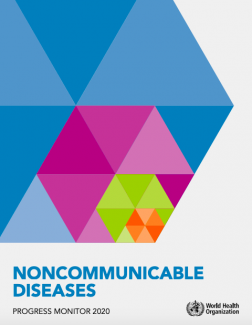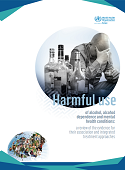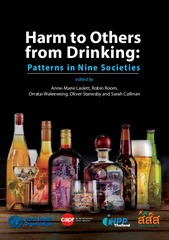Search
WHO Quitting Toolkit
Toolkit for delivering the 5A’s and 5R’s brief tobacco interventions in primary care
World Health Organisation Tobacco Health Topic
The World Health Organisation (WHO) have a health topic page dedicated to tobacco use.
The page includes:
- up to date data on smoking, tobacco control country profiles
- factsheet, infographics and maps
- the latest news, events and...
Making the European Region Safer: Developments in Alcohol Control Policies, 2010–2019
This report presents the current status of alcohol consumption, alcohol-attributable harms and the implementation of alcohol control policies in the WHO European Region, using available data from 2010, 2016 and 2019.
A detailed overview is...
Reducing Harm Due to Alcohol: Success Stories From 3 Countries
The European Region has the highest level of alcohol consumption in the world.
To reduce these harms, WHO/Europe has identified three affordable, feasible and cost-effective intervention strategies:
- increase excise taxes on alcoholic...
Through a gender lens: women and tobacco in the WHO European Region
This report provides a brief summary of some of the challenges, old and new, that women and girls face in the context of the tobacco epidemic in the WHO European Region, outlining the gendered nature of tobacco use and exposure and how the...
Estimating the Impact of Achieving Turkey's Non-communicable Disease Policy Targets
According to the World Health Organisation, around 20,000 deaths could have been avoided in Turkey in 2017 if the country had reached its current goals of reducing tobacco and salt consumption by 30%, and physical inactivity by 10%.
The...
WHO Launches Year-long Campaign to Help 100 Million People Quit Tobacco
The World Health Organisation has launched a year long campaign to help people quit their tobacco use.
As part of the campaign “Commit to Quit" the WHO have announced a new Quit Challenge on WhatsApp and have published “More than 100...
WHO/Europe Factsheet: Policy Action Needed to Reduce Cancers Attributable to Alcohol Use
This fact sheet provides up-to-date information and guidance on the links between alcohol and a range of cancers, including some of the most common types, such as female breast cancer and colorectal cancer, for those involved in designing...
WHO Guideline: Recommendations on Digital Interventions for Health System Strengthening
The key aim of this guideline is to present recommendations based on a critical evaluation of the evidence on emerging digital health interventions that are contributing to health system improvements, based on an assessment of the benefits...
World Hepatitis Day 2020
World Hepatitis Day is commemorated each year on 28 July to enhance awareness of viral hepatitis, an inflammation of the liver that causes a range of health problems, including liver cancer.
There are five main strains of the hepatitis...
WHO Management of Alcohol Withdrawal
Alcohol withdrawal can be uncomfortable and occasionally life threatening. Pharmacological management of alcohol withdrawal is an essential component of alcohol dependence. Benzodiazepines (BZDs), nonsedating anticonvulsants and...
A Guide for Tobacco Users to Quit
This self-help material was developed based on WHO Capacity Building Training Package 4 entitled “Strengthening health systems for treating tobacco dependence in primary care”. Its target audience are tobacco users. It aims to give advice...
WHO Statement: Tobacco Use and COVID-19
Tobacco smoking is a known risk factor for many respiratory difficulties. A review of studies by public health experts convened by WHO on 29 April 2020 found that smokers are more likely to develop severe disease with COVID-19, compared to...
Alcohol and COVID-19: What You Need to Know
COVID-19 is a global health crisis that is increasing the workload of healthcare professionals around the world.
In order to support practitioners during these critical circumstances, it is essential that everyone is informed about other...
How Can Telehealth Help in the Provision of Integrated Care?
The World Health Organisation defines telehealth as:
The use of telecommunications and virtual technology to deliver health care outside of traditional health-care facilities.
Well-designed telehealth schemes can improve health care...
Noncommunicable Disease Progress Monitor
Noncommunicable diseases are the leading cause of premature death globally.
Every year, 41 million people die from heart attacks, stroke, cancer, chronic respiratory diseases, diabetes or a mental disorder.
Despite the concerning trends...
Alcohol Use, Alcohol Dependence and Mental Health Conditions
Several key risk factors for noncommunicable diseases (NCDs) have been identified, including the harmful use of alcohol.
Half the world’s population drinks alcohol, and harmful alcohol use is the third leading cause of ill health and...
Harm to Others from Drinking: Patterns in Nine Societies
The adverse impact of alcohol consumption include the negative consequences of drinking on individuals other than the drinkers themselves, including both health and social problems. Alcohol’s harm to others (HTO) is an interactional...
Share the Knowledge: ISSUP members can post in the Knowledge Share – Sign in or become a member
